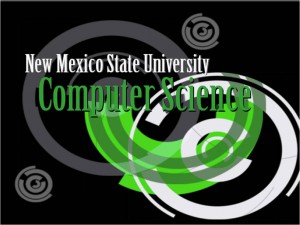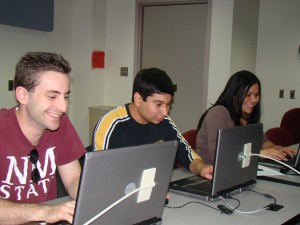 The New Mexico State University Department of Computer Science is pleased to announce the awarding of the GK-12 DISSECT (DIScover SciEnce through Computational Thinking) grant. This exciting new program puts graduate students in K-12 science, technology, engineering and mathematics classrooms in an effort to educate a new generation in ways of computational thinking.
The New Mexico State University Department of Computer Science is pleased to announce the awarding of the GK-12 DISSECT (DIScover SciEnce through Computational Thinking) grant. This exciting new program puts graduate students in K-12 science, technology, engineering and mathematics classrooms in an effort to educate a new generation in ways of computational thinking.
DISSECT aims to revitalize interest and preparation in STEM subjects in general, and computer science in particular, by infusing computational thinking and computational methods in traditional STEM classes at the middle/high school levels, and increasing teachers’ effectiveness in STEM coursework. Interest and success in STEM among K-12 minority students remains low, and among the general student population, interest in computer science has plummeted since 2000. The DISSECT approach to reversing this trend is innovative in that the use of computational concepts is not presented as an independent (and “dry”) discipline, but as a dynamic instrument of scientific reasoning and problem solving in STEM disciplines, such as biology, mathematics, and engineering.
 DISSECT proposes to address these issues by placing computer science graduate students in K-12 classrooms to investigate the relevance of their research in the broader scientific arena, and to develop communication, leadership, and team working skills to operate outside the computer science discipline. At the same time, traditional approaches to exposing young students to computing rely on introducing computing as a separate discipline, using high-level languages, with their idiosyncrasies; real world applications are introduced as illustration of computing concepts, often as an afterthought. DISSECT proposes to proceed in the opposite direction, by introducing computational thinking as a problem-solving methodology in the context of existing STEM courses. From this experience, these graduate students will become trained in maintaining a broader vision of CS research, learning how their research can be transformative in other domains, and become equipped with the skills to communicate their research ideas to different audiences, including students, teachers, and researchers, which are vital skills necessary in academia.
DISSECT proposes to address these issues by placing computer science graduate students in K-12 classrooms to investigate the relevance of their research in the broader scientific arena, and to develop communication, leadership, and team working skills to operate outside the computer science discipline. At the same time, traditional approaches to exposing young students to computing rely on introducing computing as a separate discipline, using high-level languages, with their idiosyncrasies; real world applications are introduced as illustration of computing concepts, often as an afterthought. DISSECT proposes to proceed in the opposite direction, by introducing computational thinking as a problem-solving methodology in the context of existing STEM courses. From this experience, these graduate students will become trained in maintaining a broader vision of CS research, learning how their research can be transformative in other domains, and become equipped with the skills to communicate their research ideas to different audiences, including students, teachers, and researchers, which are vital skills necessary in academia.
 Graduate students involved in this program will be given the opportunity to work as part of a dynamic team and participate in the discovery of new educational tools and methodologies, as well as impact the lives of the K-12 students, by helping them in gaining confidence and mature problem solving skills. The graduate students will also receive a two-year $30,000 stipends, as well as funds for additional educational expenses. The participating K-12 teachers also benefit from opportunities from training in using computational methods in their classrooms as well as the opportunity to work side by side with domain experts from different areas of computer science. Teachers will receive a one or two-year $5,000 stipend from participating in the program.
Graduate students involved in this program will be given the opportunity to work as part of a dynamic team and participate in the discovery of new educational tools and methodologies, as well as impact the lives of the K-12 students, by helping them in gaining confidence and mature problem solving skills. The graduate students will also receive a two-year $30,000 stipends, as well as funds for additional educational expenses. The participating K-12 teachers also benefit from opportunities from training in using computational methods in their classrooms as well as the opportunity to work side by side with domain experts from different areas of computer science. Teachers will receive a one or two-year $5,000 stipend from participating in the program.
